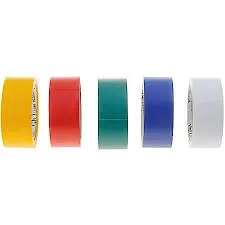The Versatility of Fabric Tape in Electrical Applications
Fabric tape, often termed as electrical fabric tape, has emerged as a vital tool in the world of electrical applications. Characterized by its cloth-like texture and strong adhesive properties, fabric tape serves a multitude of purposes beyond traditional electrical tasks. Understanding its features, benefits, and diverse uses can highlight its significance for both professionals and DIY enthusiasts.
Composition and Characteristics
Fabric tape is primarily made from a non-woven material that is designed to withstand high temperatures, making it suitable for various electrical environments. The adhesive used is typically a rubber-based compound, ensuring a strong bond that resists peeling and slippage under stress. One of the most notable features of fabric tape is its flexibility; it can easily conform to irregular surfaces, providing a secure fit around wires, cables, and other electrical components.
Additionally, fabric tape is often available in various colors, which allows for effective color-coding in installations, making it easier to manage complex wiring systems. Moreover, it is often non-conductive, which is a critical safety feature in electrical applications, as it reduces the risk of short circuits and electrical interference.
Key Benefits
The Versatility of Fabric Tape in Electrical Applications
Secondly, fabric tape provides excellent insulation properties. It helps in preventing electrical leakage, thereby reducing the risk of accidental shocks and improving the overall safety of electrical installations. The textured surface of the tape also contributes to its grip, ensuring that it stays securely in place even in high-vibration environments.
fabric tape electrical

Moreover, fabric tape is easy to use. Unlike other materials that may require additional tools for application, fabric tape can be torn by hand and applied without the mess of glue or residue. This makes it a favorite among electricians and technicians who may be working in tight or awkward spaces.
Applications
Fabric tape has a broad range of applications in the electrical field. One of its most common uses is for wrapping and insulating electrical wiring. This is especially important in projects where wires may be exposed or at risk of abrasion from movement or friction.
Additionally, fabric tape is frequently employed for securing and organizing bundles of cables. In commercial and industrial settings, neat and orderly cable management not only enhances aesthetics but also prevents potential hazards associated with tangled wires.
Beyond its insulation and wrapping capabilities, fabric tape can also be used for temporary fixes. Whether securing a loose wire or protecting exposed connections during a project, fabric tape provides a reliable solution until a more permanent repair can be made.
Final Thoughts
In conclusion, fabric tape presents a versatile and effective option for a wide range of electrical applications. Its unique properties, including durability, flexibility, and safety features, make it an essential tool for electricians and enthusiasts alike. From insulating wires to organizing cables, its multiple functionalities ensure that it is not only valuable for the task at hand but also contributes to overall safety and efficiency in electrical work.
As technology advances and new challenges arise, the role of fabric tape in the electrical domain is likely to evolve further. Whether you are undertaking a DIY project or working in a professional setting, fabric tape can provide that extra layer of confidence and reliability in your electrical tasks.
-
XIANGFAN Rubber Tape-Ultimate Solutions for All Your Insulation NeedsNewsJun.24,2025
-
XIANGFAN Rubber Tape-Protection for Industrial and Residential ApplicationsNewsJun.24,2025
-
XIANGFAN Rubber Tape: Superior Safety and Sealing for Demanding EnvironmentsNewsJun.24,2025
-
XIANGFAN Rubber Tape: Reliable Solutions for Every Electrical ChallengeNewsJun.24,2025
-
XIANGFAN Electrical & Industrial Tape: Powering Reliability Across IndustriesNewsJun.24,2025
-
XIANGFAN Electrical & Industrial Tape: Excellence in Every ApplicationNewsJun.24,2025
